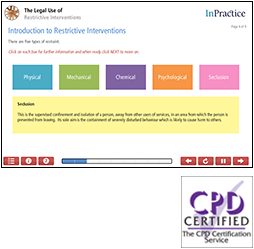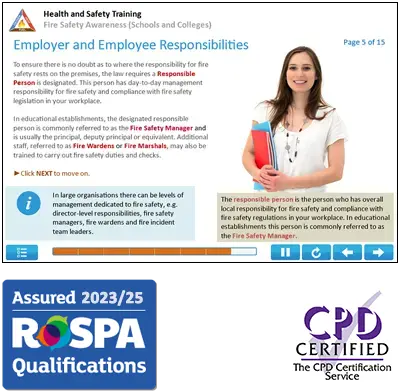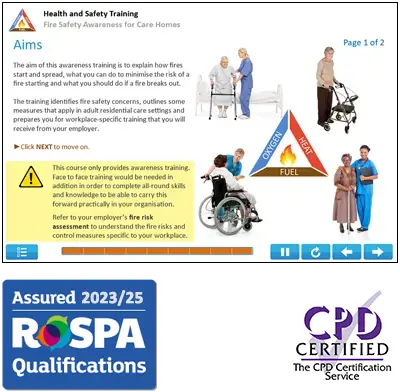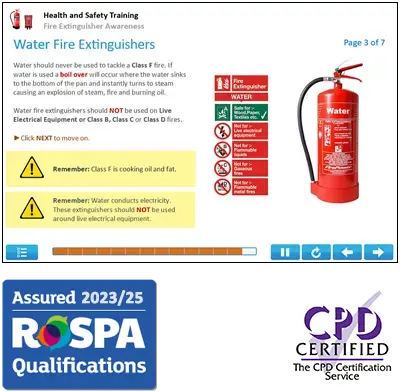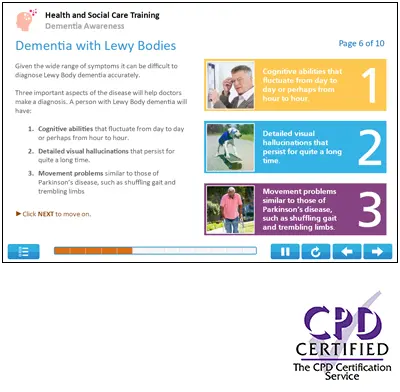Discounts Available For Bulk Purchases
| No. of licences per course |
% saving |
|---|---|
| 1 - 9 | - |
| 10 - 19 | 10% |
| 20 - 49 | 20% |
| 50 - 99 | 25% |
| 100 - 149 | 30% |
| 150 - 999 | 35% |

I2Comply have teamed up with InPractice, a medico-legal consultancy providing training on law and ethics to the NHS, private healthcare providers, professional associations and pharmaceutical companies.
Find out more
The Legal Use of Restrictive Interventions Course
£30.00 + £6.00 VAT
- Certified by CPD
- Audio voiceover
- Approximate course duration 2 hours
- Downloadable certificate on completion
This Legal Use of Restrictive Interventions online training course looks at restrictive interventions in the context of the Human Rights Act, the Mental Health Act, the Mental Capacity Act and other relevant legal and ethical principles.
The appropriate, legal use of restrictive intervention is necessary in many clinical settings. However, inappropriate use, and the lack of detailed documentation of decisions, can make healthcare professionals vulnerable to accusations of mistreatment.
Who is the Legal Use of Restrictive Interventions for?
This Legal Use of Restrictive Interventions online training course is aimed at people in health and social care roles who sometimes have to restrain people in order to administer health care or to protect them from harm.
When do I get my Legal Use of Restrictive Interventions certificate?
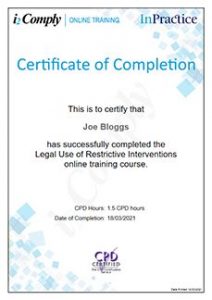
When you have successfully passed the course you will be able to download and print your certificate straight away.
All of our courses conform to the Continuing Professional Development (CPD) guidelines and have been accredited by the CPD Certification Service. Your certificate will include the CPD logo and therefore, you can use it to provide evidence for compliance.

Example Screens from the Legal Use of Restrictive Interventions course
(Click on the example screens below to view)
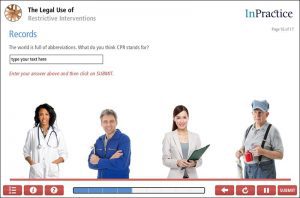
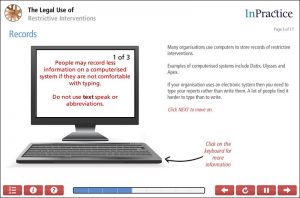
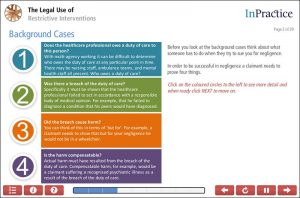
The Legal Use of Restrictive Interventions online training course contains the following 7 topics:
1 – Introduction to restrictive interventions
The first topic defines restraint and describes different types of restraint. Then you will learn about the doctrine of emergency.
2 – Background cases
The second topic uses three important cases to explain what a claimant must prove in order to establish negligence.
3 – Records
The third topic describes the characteristics of good restrictive intervention records. It goes on to describe three invaluable tools which will help you write good records.
4 – Legal Framework
Topic 4 details the legal framework of mental capacity. Your actions will differ for people who have mental capacity, people with short-term lack of capacity, and people with long-term lack of capacity. Finally, the topic covers what to do in emergency situations.
5 – Capacity assessment
Topic 5 uses the case known as ‘Re C’ to explain the test for mental capacity. It also discusses religious belief and capacity assessment.
6 – The Human Rights Act
Topic 6 identifies relevant aspects of the Human Rights Act. It uses the case of Herczegfalvy to show how human rights law relates to restrictive interventions.
7 – Deprivation of Liberty Safeguards (DoLS)
Topic 7 is about best interests and deprivation of liberty safeguards. It presents two important cases that relate to DoLS. It also covers the acid test for deprivation of liberty.
Assessment
There is an assessment at the end of the course. The assessment questions are selected from question banks which means the questions are different each time a candidate takes the assessment. Therefore the course is useful for both initial and refresher training.
We have not put any limit on the number of assessment attempts, so you can take the assessment as often as you like. You will get feedback to unsure you learn from any errors.
£30.00 + £6.00 VAT
Discounts Available For Bulk Purchases
| No. of licences per course |
% saving |
|---|---|
| 1 - 9 | - |
| 10 - 19 | 10% |
| 20 - 49 | 20% |
| 50 - 99 | 25% |
| 100 - 149 | 30% |
| 150 - 999 | 35% |
